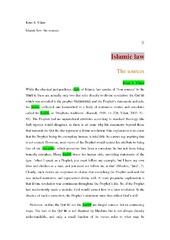| dc.description.abstract | The historiography of the early development of Islamic law, the Sharia, is highly contentious both among Muslims and secular historians. In economic field, this takes the form of the growth of an ‘Islamic banking system’, which avoids giving and taking interest on loans, as is forbidden in the Sharia. The more established groups such as the Islamic State does, however, actually often adopt a classical fiqh discourse, perhaps to bolster their image as a ‘serious Islamic’. Any law that provides morality, justice and welfare, is ‘Sharia’ as far as they are concerned. The traditional dual system of a Sharia court and a sultan’s or state court reappeared, only the state courts were not mazalim following Sharia principles, but civil courts practising the new westernized or modernized laws. The traditional Muslim historiography of fiqh does not, however, focus particularly on this ‘practised’ caliphal law, but rather on the development of groups of religious scholars who were particularly concerned with the law. | en_US |
